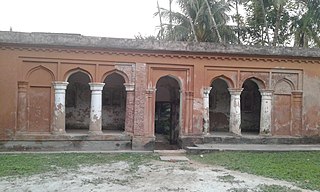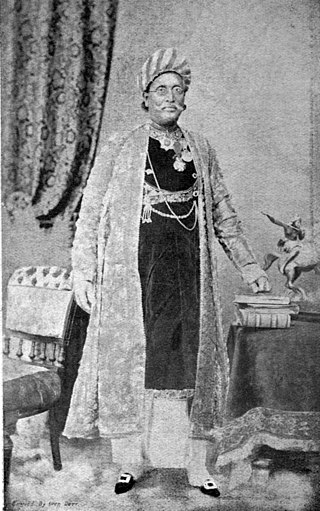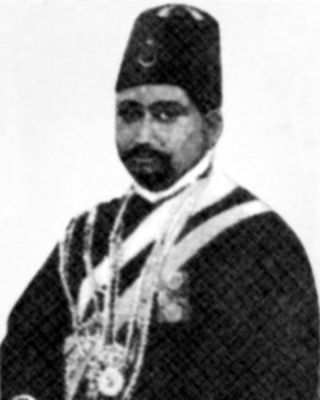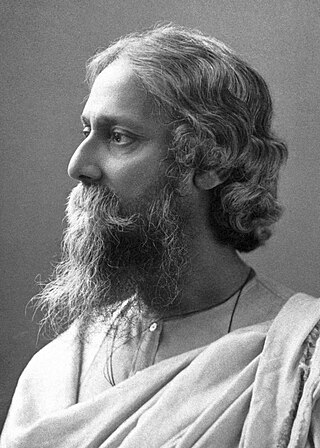Related Research Articles

Kazi Nazrul Islam was a Bengali poet, short story writer, journalist, lyricist and musician. He is the national poet of Bangladesh. Nazrul produced a large body of poetry, music, messages, novels, and stories with themes, that included equality, justice, anti-imperialism, humanity, rebellion against oppression and religious devotion. Nazrul Islam's activism for political and social justice as well as writing a poem titled as "Bidrohī", meaning "the rebel" in Bengali, earned him the title of "Bidrohī Kôbi". His compositions form the avant-garde music genre of Nazrul Gīti.

Gopalganj is a district in the Dhaka Division of Bangladesh. The district has 1,172,415 inhabitants and its surface area is 1,490 km2. The main town of the district is also called Gopalganj. It is the bank of the Madhumati river and located at 23°00’47.67" N 89°49’21.41". It is bounded by Faridpur district on the North, Pirojpur and Bagerhat district on the south, and Barisal district on the east and Narail district on the West. This district is also known as "GP" to the youth. Gopalganj is subdivided into five sub-districts (upazila/thana).

Nawab Bahadur QaziAbdul Latif was a Bengali Muslim aristocrat, educator and social worker. His title, Nawab was awarded by the British in 1880. He was one of the first Muslims in 19th-century India to embrace the idea of modernisation.

Rajbari is a district in central Bangladesh, located in the Dhaka Division. It is a part of the Greater Faridpur subregion of Bengal due to the historical and cultural identities of its inhabitants, with Kushtia border on the west, Rajbari is also the meeting point of two distinctive culture of Bangladesh.

Qazi Anwar Hussain was a Bangladeshi writer of spy thrillers, detective novels, and adventure-based literature, many of which were adaptations or heavily influenced by foreign works.

Syed Ismail Hossain Siraji was a Bengali royal as well as an author and poet from Sirajganj in present-day Bangladesh. He is considered to be one of the key authors of period of the Bengali Muslim reawakening; encouraging education and glorifying the Islamic heritage. He also contributed greatly to introducing the Khilafat Movement in Bengal, and provided medical supplies to the Ottoman Empire during the Balkan Wars. Anal-Prabaha, his first poetry book, was banned by the government and he was subsequently imprisoned as the first South Asian poet to allegedly call for independence against the British Raj. The government issued Section 144 against him 82 times in his lifetime.

Shawkat Ali was a politician and a leader of the Bengali Language Movement. He was one of the founders of Awami Muslim League - which later became the Awami League and is now the Bangladesh Awami League. He was a member of all three Rastrabhasa Sangram Parishad. He was also the Chief Organizer of the Dhaka City Awami League during the 1950s. His house in 150, Chawk Moghultuly, Dhaka was the center for many activities and meetings during the Language Movement. He died of a stroke on August 18, 1975. He is buried in Jurain graveyard in Dhaka.
Mohammad Yakub Ali Chowdhury was a Bengali essayist and journalist. He was noted as one of the few Bengali Muslim literary scholars of his time.

Bengali novels occupy a major part of Bengali literature. Despite the evidence of Bengali literary traditions dating back to the 7th century, the format of novel or prose writing did not fully emerge until the early nineteenth century. The development of Bengali novel was fueled by colonial encounter, booming print culture, growth of urban centers, and increased middle-class readership Upanyas, the Bangla word for novel, is derived from the words upanay and upanyasta.

Muzaffar Ahmad was an Indian-Bengali politician, journalist and a co-founder of the Communist Party of India.

Qazi Motahar Hossain was a Bangladeshi writer, scientist, statistician, chess player, and journalist.
Kazi is a family name in Bengal, it originates from the Arabic qadi meaning judge and is typically used among Muslims. Kazi, also spelt Qazi and Quazi, is a title awarded to Islamic judges, commonly used hereditarily in Bengal as a family name.

Ahmed Hossain, minister for agriculture, forest and fisheries department in Huseyn Shaheed Suhrawardy's cabinet 1946/47, chairman of Rangpur District Board, minister for agriculture in East Pakistan in Abu Hossain Sarkar's cabinet 1955–56. Represented his Shagata and Fulchari constituency, of Gaibandha District as MLA and MP from 1937 to 1958.

The Freedom of Intellect Movement was a Bengal Renaissance movement advocating rationality against religious and social dogma in Bengali Muslim society. It was spearheaded by intellectuals in the University of Dhaka during the British Raj.The movement also established the prestigious Muslim Literary Society in Dhaka.
Khan Bahadur Abū Muḥammad ʿAbdul Ghafūr, better known by his pen name Nassakh, was a British Indian officer, writer, literary critic and collector. He is best known for his magnum opus Sukhan-e-Shuara which was a biography of prominent Urdu and Persian poets. He organised mushaira in places where he worked; inspiring young Urdu poets in Bengal.
Mohammad Rowshan Ali Chowdhury was a Bengali journalist, writer, poet and politician.
The Kohinoor was a Bengali language newspaper, first published in July 1898. Initially focusing on miscellaneous topics such as Islamic culture, its third relaunch was a pivot of Hindu-Muslim harmony. The paper targeted both Hindu and Muslim clientele.
Abdul Hamid, popularly known as Minister Abdul Hamid, was a Bengali lawyer, educationist and politician. He was a former president and education minister of the Assam Legislative Council. From 1947 to 1954, he served as the education minister of East Bengal.
Shashwata Banga(Bengali: শাশ্বত বঙ্গ) is a book on Bengali language, Bengali literature, and the cultural history of Bengalis. It is considered an important documentary work in Bengali literature. It offers a perspective on the thoughts and culture of Bengali society. The language and analysis of the book encourage intellectual thought, making it recognized as a progressive piece of Bengali literature. The book reflects the ideas of the Freedom of Intellect Movement.
References
- ↑ "Qazi Motahar Hossain: A man of unparalleled dexterity". Qazi Motahar Hossain: A man of unparalleled dexterity | theindependentbd.com. Retrieved 2023-03-20.
- ↑ Nirbachito probondho ,Kollol prokashoni ISBN 984 617 009 2
- ↑ Discussion on Kazi Abdul Odud held on Department of Bengali , Govt. Rajendra college Faridpur . Date : 10-3-2013
- ↑ Kazi Abdul Wadud : Somaj cheytona ,Dr. Sahin Afjal .First publish : Ekushey Boimela 2005
- ↑ Kazi Abdul Oduder songkhipto Jibonponji ,porishistho ,Nirbachito probondho Edition : Mossamot Selina khatun .,Lecturer ,Bengali ,Eden Govt. Mohila college
- ↑ Discussion on Kazi Abdul Odud held on Department of Bengali , Govt. Rajendra college Faridpur . Date : 10-3-2013
- ↑ Nirbachito probondho ,Kollol prokashoni ISBN 984 617 009 2